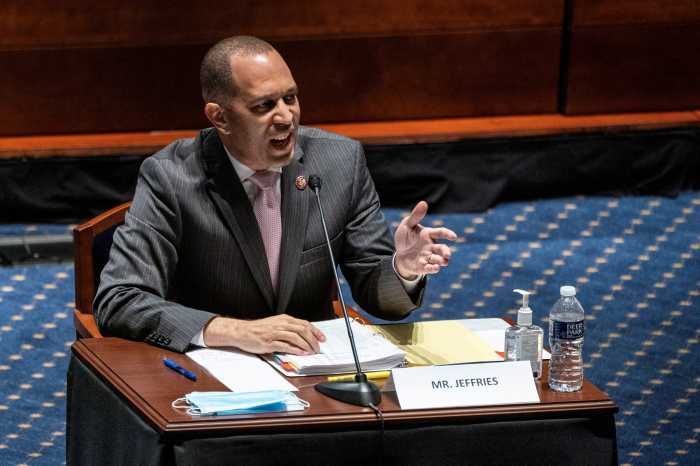Few know her name or have seen her on TV, but Elizabeth MacDonough is one of the most important people in Washington.
As the Senate’s parliamentarian, MacDonough advises lawmakers about what is acceptable under the chamber’s rules and precedents. Her advice on arcane points of Senate procedure usually doesn’t make the headlines, but can have lasting consequences.
In the weeks ahead, MacDonough likely will be asked to advise on what Democrats can include in a $3.5 trillion spending bill that is a top priority for Democratic President Joe Biden.
One major question will be whether Democrats can include immigration reform in the package, to be passed by budget reconciliation, which gets around Senate rules requiring 60 of the chamber’s 100 members to agree on most legislation.
WHO IS THE PARLIAMENTARIAN?
MacDonough, 55, is the first woman ever to serve as Senate parliamentarian, a post created in 1935. She has held the job since 2012 under Democratic and Republican majorities. The parliamentarian is chosen by the Senate majority leader, but is expected to be nonpartisan.
Always an important role in a place where the rule book is king, the job of parliamentarian has become even more pivotal in the 50-50 Senate, where parties may seek advantage by manipulating the rules.
Earlier this year, MacDonough sorely disappointed progressive Democrats by advising that a proposal to raise the minimum wage to $15 an hour could not be included in Biden’s COVID-19 relief legislation.
Biden’s Democrats are hoping to pass a $3.5 trillion raft of climate and social spending measures under the same reconciliation process that was used to pass the COVID-19 bill. They have the thinnest possible Senate majority – just one vote – if they all stick together and Vice President Kamala Harris breaks a tie.
HOW WOULD THE PARLIAMENTARIAN CONSIDER THE IMMIGRATION PROPOSAL?
Any senator could query whether the Democrats can tuck their immigration proposal into a budget bill, either by asking MacDonough, or by raising the issue on the Senate floor.
Reconciliation measures are supposed to have budgetary impact, meaning they must spend or raise government funds.
Under that definition, immigration proposals might seem to be an even longer shot than a $15 minimum wage. However, a provision for immigrant visas was passed by a Republican-led Senate by reconciliation in 2005.
Charles Tiefer, a law professor at the University of Baltimore, argues that immigration proposals would have budgetary impact in the form of tax revenue. “If the immigrants are given legal status, they will pay to the Treasury many billions of dollars in income tax,” he said.
MacDonough once worked as a trial attorney handling immigration cases for the U.S. Department of Justice. It’s impossible to know how this might affect her thinking; she does not give interviews, and did not grant one for this story.
CAN THE PARLIAMENTARIAN BE OVERRULED OR FIRED?
The parliamentarian’s advice can be ignored or overturned by the presiding officer of the Senate. This is rare, but then-Vice President Nelson Rockefeller did it in 1975 in a debate over the Senate filibuster rules.
MacDonough has said publicly that her advice was overturned in 2013, when Democrats removed the 60-vote threshold for voting on most presidential nominees, apart from the Supreme Court; and in 2017, when Republicans did the same thing for Supreme Court nominees.
Harris could overrule MacDonough, and some progressives urged her to do so on the minimum wage issue, but the White House rejected the idea.
The parliamentarian can also be fired. This happened in 2001, when then-Majority Leader Trent Lott dismissed parliamentarian Robert Dove over some rulings that upset Republicans.
MacDonough already has faced calls for her ouster.
“What’s a Democratic majority if we can’t pass our priority bills? This is unacceptable,” Representative Ilhan Omar, a progressive Democrat, tweeted in February after MacDonough’s minimum wage advice.
In a 2018 commencement speech to her alma mater, the University of Vermont law school, MacDonough was stoic about the criticism. She recalled getting hate mail and “some threats from lovely fellow citizens, suggestions of what I should have actually done with my life.”
“Still I have to tell you that I love my job,” MacDonough said cheerily. “It’s worth it. It’s all worth it.”





































